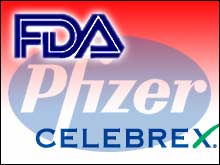|
Life after Vioxx is good for Celebrex With Merck's Vioxx gone, Pfizer's Celebrex enjoys monopoly status, but can the Cox-2 arthritis drug market come back? NEW YORK (CNNMoney.com) -- In the nearly two years since Merck pulled its tainted blockbuster Vioxx from the market, Pfizer has enjoyed a monopoly-like market for its own arthritis drug, Celebrex. Pfizer (down $0.14 to $28.33, Charts), the biggest drug company in the world with more than $50 billion in annual sales, could very well meet its $2 billion goal for Celebrex sales this year.
The Celebrex sales tally was just shy of $1 billion for the first half of the year, and even the slightest ramp-up in sales could exceed $2 billion for 2006. The company admitted in its first quarter earnings release that $2 billion was "an ambitious target given the ongoing pressures in the arthritis market." But prospects for growth are looking good: The number of new prescriptions for Celebrex has risen 9 percent year-to-date, according to Barbara Ryan, analyst for Deutsche Bank North America. It wasn't always such an uphill struggle for Pfizer. In 2004, Celebrex sales totaled $3.3 billion, but the following year, sales were nearly cut in half. The dark days What happened to Celebrex? Vioxx happened, and Celebrex did not emerge unscathed from the ensuing fray with the FDA. Celebrex, its former competitor Vioxx, and its sister drug Bextra (which was also produced by Pfizer) are arthritis drugs that work in similar ways as anti-inflammatory painkillers. They're all members of the same drug class, known as Cox-2 inhibitors and NSAIDs (non-steroidal anti-inflammatory drugs,) and they once totaled $8 billion in annual sales. But the Cox-2 market took a now infamous blow on Sept. 30, 2004 when Merck (down $0.11 to $41.83, Charts) pulled Vioxx off the market after a study showed an increased risk of heart attack and stroke in patients who took the drug. Not only did Merck bid adieu to $2.5 billion in annual sales from Vioxx, but more than 14,000 lawsuits have been filed against the drugmaker by former Vioxx patients and their families, blaming the drug for fatal and non-fatal heart attacks. Pfizer lost one of its Cox-2 blockbusters - Bextra- in April 2005, when the Food and Drug Administration asked the company to pull the drug from the market because of health risks, a move that vaporized $1.3 billion in annual sales. The Celebrex Monopoly Celebrex sales now seem paltry compared to its $3.3 billion for 2004, but the drug is still a blockbuster. Celebrex was never forced off the market by the FDA, and now enjoys a competition-free atmosphere. "They certainly have the Cox-2 market all to themselves," said Les Funtleyder, analyst for Miller Tabak, referring to Pfizer. "If the FDA thought the risk outweighed the benefit, I think it would have pulled [Celebrex] off the market." The FDA ruled that the benefits of Celebrex outweighed the risks, but decided that Bextra had to go, when the agency received reports of seven deaths from "serious skin reactions." Still, Celebrex didn't exactly get a free pass from the FDA. In 2005, the FDA told Pfizer to put a "black box," the most serious type of warning, on the Celebrex label to reflect risks that the drug "may increase the chance of a heart attack or stroke that can lead to death." The label also contains warnings of stomach bleeding. Gail Cawkwell, senior medical director for Pfizer, said that all prescription NSAIDs - including Motrin, Naproxen, Mobic and others - carry black box warnings for heart attack risks. As for the gastro-intestinal bleeding, Cawkwell said Pfizer is conducting three Celebrex studies on stomach safety, and completion of the earliest study is at least a year away. "We're running some research studies right now that will help address questions about Celebrex safety for the stomach," said Cawkwell. She said that new safety data would be filed with the FDA. A Tainted Market? Although Celebrex has the U.S. monopoly on Cox-2 inhibitors, that market may never return to its former glory. "[Celebrex] is definitely benefiting as the only Cox-2 on the market," said Michael Krensavage, analyst for Raymond James. He said that Celebrex "is starting to come back a bit" in terms of sales, though he added: "The market has been tainted and doctors are afraid." But Krensavage believes both Vioxx and Celebrex should be available to patients. "To me, it seems that as long as Merck would adequately disclose the risks it should be on the market, because some people don't benefit from anything else," said Krensavage. "I think it's important for people to have a choice." Novartis (up $0.06 to $58.07, Charts) also produces a Cox-2 inhibitor called Prexige, but it is not available in the U.S. Funtleyder of Miller Tabak said it's unlikely Prexige will be introduced to the U.S. market, given the problems with Vioxx and Bextra. None Of Pfizer's other big U.S. rivals, Bristol-Myers (Charts), Johnson & Johnson (down $0.03 to $64.16, Charts) and Abbott Laboratories (down $0.36 to $48.19, Charts), produce a Cox-2 painkiller. The analysts interviewed for this story do not own shares of stock in the companies mentioned here. |
|

